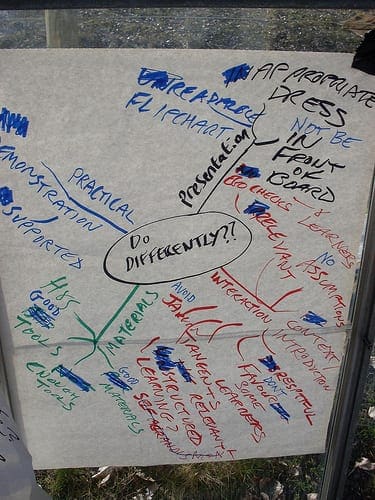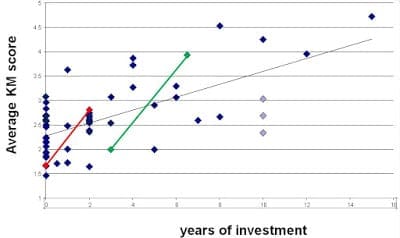
Favorite Knowledge Management is a simple concept, let’s explain it in simple words. So much of Knowledge Management is about communication; the communication of knowledge, solutions, work-around, tips and hints, the communication of concepts and ideas. Communication to stakeholders is the main thing we do as part of the change
Read More
 Shared by Nick Milton July 16, 2018
Shared by Nick Milton July 16, 2018

Favorite A decision log can be a useful tool in learning, and as part of a KM system Many projects and many non-project bodies maintain a decision log, to keep track of, and to publish, the major decisions which have been made. This allows you later to revisit the decisions,
Read More
 Shared by Nick Milton July 13, 2018
Shared by Nick Milton July 13, 2018

Favorite Embedded KM is as normal as any other embedded work practise, such as budgeting or time writing. People often ask “what does embedded KM look like? The answer is that it looks like any other embedded management discipline. It’s a work habit – something you dont think twice about.
Read More
 Shared by Nick Milton July 12, 2018
Shared by Nick Milton July 12, 2018
Favorite We have decided to open the results of our KM Survey to the public. In April 2014, and again in April 2017, Knoco Ltd conducted a global survey of Knowledge management activity and trends. Participation was free and confidential, and all participants received a free Knowledge Management Survey report.
Read More
 Shared by Nick Milton July 11, 2018
Shared by Nick Milton July 11, 2018

Favorite To learn from the past, we need to reflect on the past, and questions are crucial for prompting reflection. When you observe the conversations and presentations at conferences and in organisations, they are very often stories about the past. “We did this, we did that, this happened, we met
Read More
 Shared by Nick Milton July 10, 2018
Shared by Nick Milton July 10, 2018

Favorite Knowledge Management can be started quickly, but takes a long time to fully embed. Here are two sources of data that show exactly how long. Over the past few years we have helped many organisations to benchmark their “current status” of Knowledge Management. They ask for this for a number of
Read More
 Shared by Nick Milton July 9, 2018
Shared by Nick Milton July 9, 2018

Favorite According to one article, there are 3 main traps a KM implementation can fall into. Traps, by Paul Asman and Jill Lenoble, on Flickr The article is in a study on Enabling Communities of Practice at EADS-Airbus. One of the articles in this study, by Marleen Huysman and Dirk
Read More
 Shared by Nick Milton July 6, 2018
Shared by Nick Milton July 6, 2018

Favorite KM should focus primarily on getting knowledge out quickly, and worry about production quality later S is for Speed, by Ansgar Koreng on Flickr Here is an interesting article from the customer-service wing of KM, entitled “5 ways to use team knowledge to do better work”. The one that
Read More
 Shared by Nick Milton July 5, 2018
Shared by Nick Milton July 5, 2018

Favorite Sometimes learning from personal failure is the way to win. Gareth Southgate in despain after missing the penalty in 1996,an event which indirectly led to Englands win last night. Last night England beat Colombia in the Football World Cup quarter final. The game was decided on a penalty shoot-out
Read More
 Shared by Nick Milton July 4, 2018
Shared by Nick Milton July 4, 2018

Favorite “Learning before, during and after” is a common principle applied to knowledge management in project-based organisations. But what does it really mean? We may have read about the principle of learning before, during and after in projects, but if you want to see how it really works in practice,
Read More
 Shared by Nick Milton July 3, 2018
Shared by Nick Milton July 3, 2018
![]() Shared by Nick Milton July 16, 2018
Shared by Nick Milton July 16, 2018








